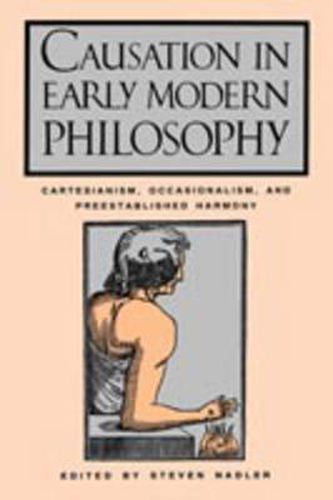Readings Newsletter
Become a Readings Member to make your shopping experience even easier.
Sign in or sign up for free!
You’re not far away from qualifying for FREE standard shipping within Australia
You’ve qualified for FREE standard shipping within Australia
The cart is loading…






Three general accounts of causation stand out in early modern philosophy: Cartesian interactionism, occasionalism, and Leibniz’s preestablished harmony. The contributors to this volume examine these theories in their philosophical and historical context. They address them both as a means for answering specific questions regarding causal relations and in their relation to one another, in particular, comparing occasionalism and the preestablished harmony as responses to Descartes’s metaphysics and physics and the Cartesian account of causation. Philosophers discussed include Descartes, Gassendi, Malebranche, Arnauld, Leibniz, Bayle, La Forge, and other, less well-known figures. Contents Steven Nadler Introduction Daniel Garber Descartes and Occasionalism Eileen O'Neill Influxus Physicus Steven Nadler The Occasionalism of Louis de la Forge Richard A. Watson Malebranche, Models, and Causation Mark A. Kulstad Causation and Preestablished Harmony in the Early Development of Leibniz’s Philosophy Margaret D. Wilson Compossibility and Law Donald P. Rutherford Natures, Laws, and Miracles: The Roots of Leibniz’s Critique of Occasionalism Catherine Wilson Constancy, Emergence, and Illusions: Obstacles to Naturalistic Theories of Vision Thomas M. Lennon Mechanism as a Silly Mouse: Bayle’s Defense of Occasionalism Against the Preestablished Harmony Lois Frankel The Value of Harmony
$9.00 standard shipping within Australia
FREE standard shipping within Australia for orders over $100.00
Express & International shipping calculated at checkout
Three general accounts of causation stand out in early modern philosophy: Cartesian interactionism, occasionalism, and Leibniz’s preestablished harmony. The contributors to this volume examine these theories in their philosophical and historical context. They address them both as a means for answering specific questions regarding causal relations and in their relation to one another, in particular, comparing occasionalism and the preestablished harmony as responses to Descartes’s metaphysics and physics and the Cartesian account of causation. Philosophers discussed include Descartes, Gassendi, Malebranche, Arnauld, Leibniz, Bayle, La Forge, and other, less well-known figures. Contents Steven Nadler Introduction Daniel Garber Descartes and Occasionalism Eileen O'Neill Influxus Physicus Steven Nadler The Occasionalism of Louis de la Forge Richard A. Watson Malebranche, Models, and Causation Mark A. Kulstad Causation and Preestablished Harmony in the Early Development of Leibniz’s Philosophy Margaret D. Wilson Compossibility and Law Donald P. Rutherford Natures, Laws, and Miracles: The Roots of Leibniz’s Critique of Occasionalism Catherine Wilson Constancy, Emergence, and Illusions: Obstacles to Naturalistic Theories of Vision Thomas M. Lennon Mechanism as a Silly Mouse: Bayle’s Defense of Occasionalism Against the Preestablished Harmony Lois Frankel The Value of Harmony